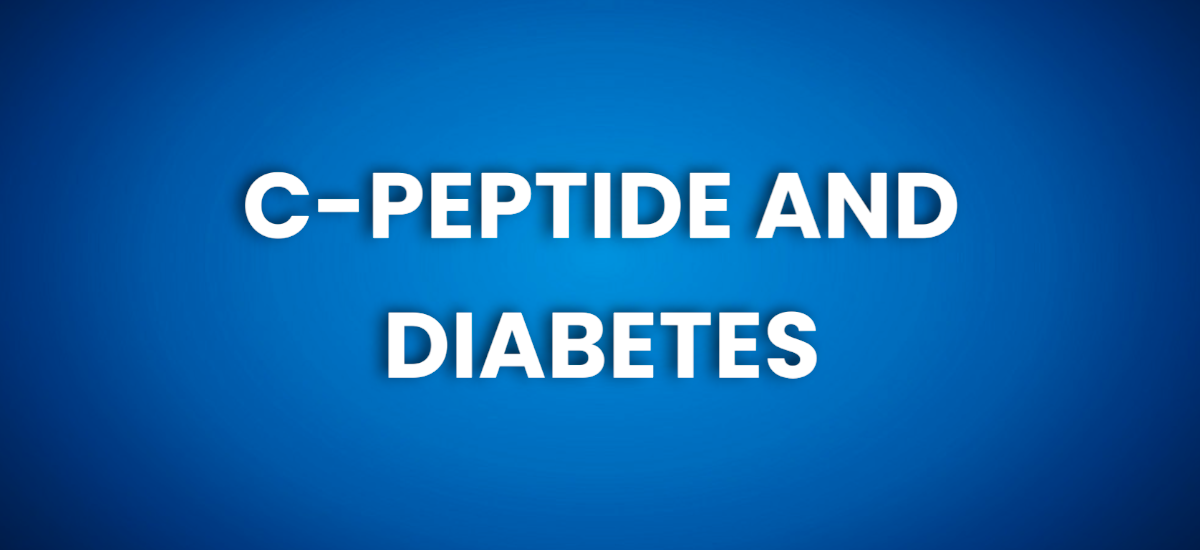C-peptide is created inside the body as a byproduct of Proinsulin produced by pancreatic beta cells. The level of C-peptide can unlock crucial insights into conditions like diabetes and insulin resistance. Insulin c peptide levels are essential to learn about and are found using a simple blood test.
C-Peptide Overview
C-peptide is comprised of two amino acids. It is produced in the pancreas during the production of insulin as a result of your body signaling the need for insulin production [1]. Your pancreas springs into action by producing something called Proinsulin. To create Insulin, our bodies break down Proinsulin, resulting in both Insulin and C-peptide [1].
So why should you care about C-peptide? Well, because even though they’re created at the same time, they complete different actions within the body. Unlike Insulin, which rapidly leaves our bloodstream after doing its job regulating glucose levels source, c-peptide stays within the bloodstream for a longer period of time [1].
The Pancreas And C-Peptide Production
Your pancreas might seem like just another organ tucked away inside your abdomen, but it is needed to facilitate blood sugar regulation [2].
This gland is versatile, but one thing it contributes to is it produces Insulin and C-Peptides. This vital function happens within special cells known as beta cells located inside Islets of Langerhans [2].
Here is where Proinsulin, is broken down into the finished products – Insulin and C-peptide.
C-Peptide Testing
C-peptide testing can give insight by diagnosing diabetes and other conditions related to insulin production within the body. Measuring C-peptide levels can give accuracy into how much insulin your body is producing [3].
Patients with type 1 usually have a low level of C-peptide due to inadequate insulin production by their pancreas. On the flip side, those with type 2 often show normal or high levels as their bodies don’t use insulin well. Too much insulin can be present in the bloodstream where it is not being used within the body [4].
Insulinoma Detection
An elevated level of C-peptides might indicate a rare tumor called an insulinoma is present within the body [5].
Evaluating Pancreatic Function Post-Surgery
C-peptide tests are also beneficial when assessing pancreatic function after surgery. It gives doctors important data about remaining healthy tissue by tracking how it’s making and releasing insulin post-surgery [2].
Finding the Cause Behind Hypoglycemia
If you’ve ever felt dizzy, shaky, or even sweaty without knowing why – hypoglycemia could be the culprit. By measuring the amount of C-peptide in your blood, doctors can pinpoint if an overproduction of insulin is causing these low sugar levels [4].
How is C-Peptide Tested?
The testing process for C-peptide isn’t as complex as you might think. In reality, the process for testing C-peptide is much like any other blood test.
A Simple Blood Draw
To start with, a healthcare professional will use a small needle to draw some blood from your arm or hand. This part of the process may cause slight discomfort.
Once they have taken the necessary amount of blood, the needle will be withdrawn and pressure applied to the injection site to prevent any bleeding.
Sending It Off For Analysis
The next step involves sending this sample off to a laboratory where trained professionals perform detailed tests on it. The lab technicians analyze various components within your blood sample using high-tech equipment.
Finding Out Your Results
You won’t need to wait long before getting results back from your C-peptide test either. Most labs can provide them within 24 hours. If there are any significant findings related to diabetes or insulin production problems, these will be highlighted by medical professionals interpreting results based on established norms.
Ultimately, understanding your level of C-peptide can help in better managing diabetes or identifying any related conditions early.
Who Should Have a C-Peptide Test?
If you have been diagnosed with diabetes, or are at risk of developing it, the C-peptide test should be included in your regular medical assessments.
Patients who experience frequent episodes of low blood sugar may also need this test. These hypoglycemic episodes can signal excessive insulin production in the body [6].
The benefits of this test are tangible and immediate – accurate diagnosis means better treatment options to manage diabetes and insulin resistance.
C-peptide: An Important Marker
You might wonder why we’re focusing on C-peptide instead of directly measuring insulin levels.
C-peptides can be found in our blood for a longer period of time than insulin because our bodies break it down at a slower rate. Testing for them gives doctors more reliable data about how much insulin your pancreas is producing over time.
Diabetes Isn’t Always Black & White
Sometimes people show symptoms similar to those seen in diabetics but aren’t quite diabetic yet—a sort-of gray area known as prediabetes. In these cases, too, a C-peptide test becomes essential in diagnosing this condition.
Where Can I Find Research Chemicals and Peptides?
You can start by exploring ResearchChemical.com. This online vendor has several compounds available for research purposes only. If you can not find what you are seeking, search our database to seek a qualified health professional who can assist you with your needs.
Digging Deeper: Specialty Stores
If you’re after something more specific like C-peptide or other unique peptides, specialty stores may be your best bet. Platforms like Research Chemical offer an array of specialized research chemicals that are third-party tested.
Finding what you need isn’t always about knowing where to look but also how. For example, when searching through product lists use precise keywords rather than generic terms (think ‘human insulin-like growth factor’ instead of simply ‘growth factor’). A precise query can guide you to the exact item you need.
Be sure to only purchase from legal vendors who adhere to local and international regulations for your own safety and ethical research. Ensure not only your personal safety but also uphold ethical research standards by securing reliable suppliers for research chemicals and peptides. Always place quality at the forefront of your supplier selection process.
Key Takeaway:
Looking for research chemicals and peptides like C-peptide might feel overwhelming, but don’t worry. Begin your search at places like ResearchChemical.com. If you need something more specific that isn’t listed, ask a qualified medical professional in your local area.
How Can I Contact Physicians and Medical Professionals?
Find the right medical professional to help with your diabetes care or endocrinology needs.
Try getting in touch with a medical facility near you. Most of these institutions have directories that list their physicians, along with contact details and areas of specialization. These listings often include doctors who specialize in diabetes care and endocrinology.
Contacting Online Specialists
If you’re comfortable navigating the internet, then online platforms are an excellent resource too. Here you can be provided with a database filled with qualified professionals across different specialties.
A Note on Telemedicine
Telemedicine has emerged as a more convenient way to gain healthcare access. Consult certified physicians from anywhere around the globe at any time via video call – perfect for those seeking advice about a C-peptide level without leaving home.
Important Considerations
Keep in mind that selecting a healthcare professional goes beyond verifying their credentials. It entails finding an individual who attentively listens to your needs and honors your concerns—someone who can collaborate with you in navigating your healthcare journey, especially when it concerns comprehending C-peptide levels or addressing diabetes.
Key Takeaway:
Finding a doctor for your diabetes care or C-peptide queries isn’t as daunting as it seems. Use local hospital directories, online platforms, and even telemedicine services. The best professional is not just knowledgeable but also empathetic to your health journey.
What Are The Risks Associated With C-Peptide Testing?
Despite its importance in diagnosing diabetes, the process of getting a C-peptide test might seem intimidating. But rest assured, there are no known risks linked to this testing procedure.
The most you’ll experience is a minor discomfort when your blood is drawn. This brief moment of discomfort can provide crucial information about your body’s insulin production and help physicians tailor their treatment plans more effectively.
FAQs in Relation to C-Peptide
C-peptide levels show how much insulin your pancreas is making. It’s a key tool in diagnosing diabetes and other conditions and can be detected via a blood sample. To complete this, ask a physician about a C-peptide test at your next visit.
If your C-peptide is high, that means there is an overabundance of insulin in the body that is being created. This could signal insulin resistance or type 2 diabetes. Connecting peptide insulin and C-peptide can increase your knowledge surrounding your body’s overall health.
A low level of C-Peptide often suggests Type 1 Diabetes because the body isn’t producing enough insulin on its own.
Treating high c-Peptides involves addressing underlying causes like obesity or poor diet which are leading to excess insulin production in the first place.
Conclusion
C-peptide is a byproduct of Proinsulin that can help us understand conditions like diabetes.
C-Peptide levels can be tested in a routine blood draw.
Finding research chemicals and peptides may seem daunting, but remember there are resources available online!
Contacting medical professionals for help shouldn’t be intimidating either – they’re there to guide you through your health journey.
Scientific Research References:
1. Oyer, P. E., Cho, S., Peterson, J. D., & Steiner, D. F. (1971). Studies on human proinsulin: Isolation and amino acid sequence of the human pancreatic C-peptide. Journal of Biological Chemistry, 246(5), 1375-1386.
2. Michaud, D. S., Wolpin, B., Giovannucci, E., Liu, S., Cochrane, B., Manson, J. E., … & Fuchs, C. S. (2007). Prediagnostic plasma C-peptide and pancreatic cancer risk in men and women. Cancer Epidemiology Biomarkers & Prevention, 16(10), 2101-2109.
3. Tang, D. Q., Cao, L. Z., Burkhardt, B. R., Xia, C. Q., Litherland, S. A., Atkinson, M. A., & Yang, L. J. (2004). In vivo and in vitro characterization of insulin-producing cells obtained from murine bone marrow. Diabetes, 53(7), 1721-1732.
4. Welborn, T. A., Garcia-Webb, P., & Bonser, A. M. (1981). Basal C-peptide in the discrimination of type I from type II diabetes. Diabetes Care, 4(6), 616-619.
5. Kao, P. C., Taylor, R. L., & Service, F. J. (1994). Proinsulin by immunochemiluminometric assay for the diagnosis of insulinoma. The Journal of Clinical Endocrinology & Metabolism, 78(5), 1048-1051.
6. Jeyam, A., Colhoun, H., McGurnaghan, S., Blackbourn, L., McDonald, T. J., Palmer, C. N., … & McKeigue, P. M. (2021). Clinical impact of residual C-peptide secretion in type 1 diabetes on glycemia and microvascular complications. Diabetes Care, 44(2), 390-398.






